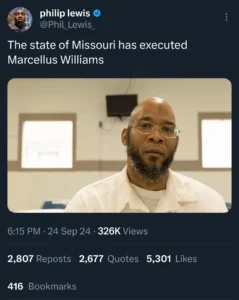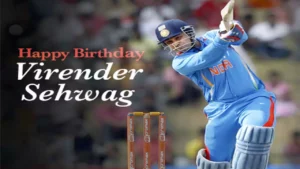
Justice Denied: Marcellus Williams Executed Amid Doubts of Innocence

In a deeply troubling turn of events, Marcellus Williams, a 55-year-old man, was executed by lethal injection in Missouri on September 24, 2024, despite significant doubts surrounding his conviction for the 1998 murder of Lisha Gayle. The execution has sparked outrage and calls for justice from advocates and members of the public who believe that an innocent man was put to death.
Background of the Case

Williams was convicted in 2001 for the brutal stabbing of Lisha Gayle, a former journalist who was killed in her home during what appeared to be a burglary gone wrong. Gayle was stabbed over 40 times, and while Williams was arrested based on testimony from jailhouse informants, physical evidence linking him to the crime scene was notably absent. Key evidence, including fingerprints and bloodied shoe prints, did not match Williams.Throughout his time on death row, Williams maintained his innocence, asserting that he had been wrongfully convicted. His legal team raised serious concerns about the integrity of the trial, including allegations of racial bias in jury selection and mishandling of DNA evidence. Notably, recent testing revealed that DNA found on the murder weapon belonged to individuals from the prosecutor’s office who had handled it without gloves, raising questions about contamination.
Legal Proceedings and Appeals
Despite numerous appeals and calls for clemency from both the victim’s family and St. Louis County Prosecuting Attorney Wesley Bell, who argued that executing someone with lingering doubts about their guilt is unjust, Governor Mike Parson and Missouri’s Supreme Court denied all requests to halt the execution. Bell emphasized that “if there is even the shadow of a doubt of innocence, the death penalty should never be an option,” highlighting the ethical implications of carrying out such a sentence under questionable circumstances.On the day of his execution, Williams expressed his faith in a final statement: “All praise be to Allah in every situation.” His execution took place shortly after 6 PM local time at the Eastern Reception, Diagnostic and Correctional Center in Bonne Terre.
Community Response and Outrage
The execution has ignited protests across Missouri, with demonstrators gathering outside the prison to voice their opposition to capital punishment and to advocate for Williams’ innocence. The NAACP condemned the execution, with President Derrick Johnson stating that “tonight, Missouri lynched another innocent Black man.” This sentiment reflects broader concerns about racial disparities within the criminal justice system and its handling of death penalty cases.The victim’s family had previously expressed their desire for Williams’ sentence to be commuted to life imprisonment without parole, believing that this would provide them with closure without resorting to execution. Their pleas were ignored as state officials prioritized upholding the original conviction.
Conclusion
Marcellus Williams’ execution raises profound questions about justice, fairness, and the reliability of capital punishment in America. As states continue to grapple with issues surrounding race, evidence integrity, and wrongful convictions, this case serves as a stark reminder of the potential consequences of a flawed legal system. The outcry following Williams’ death underscores an urgent need for reform in how capital punishment is administered and how justice is served in cases where doubt persists.As advocates continue to fight for systemic change, Marcellus Williams’ story will remain a critical part of discussions surrounding justice reform and the future of the death penalty in the United States.
Discover more from
Subscribe to get the latest posts sent to your email.







